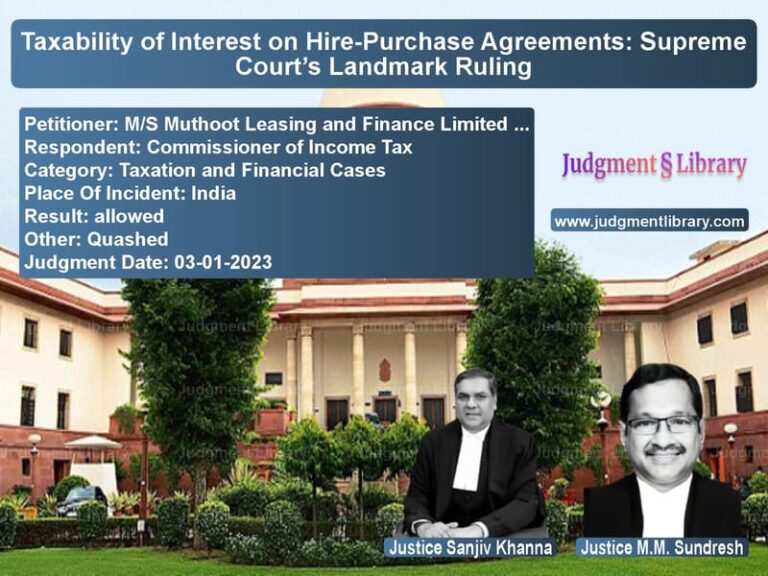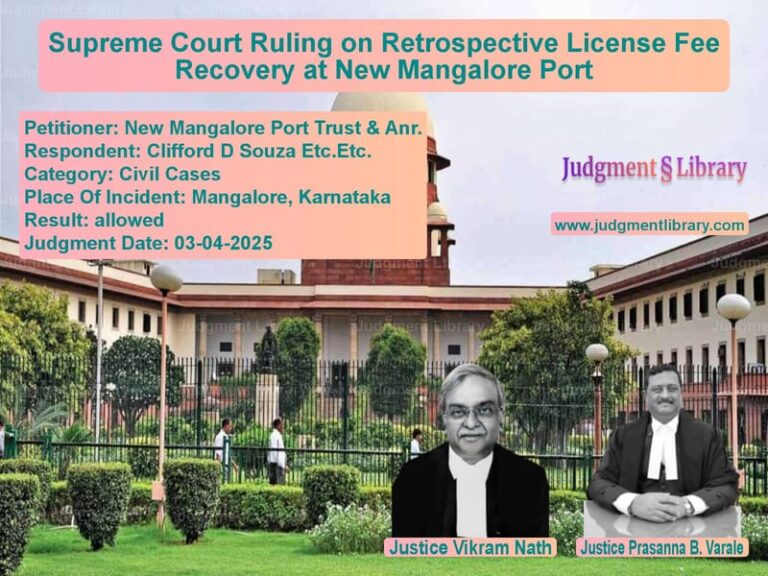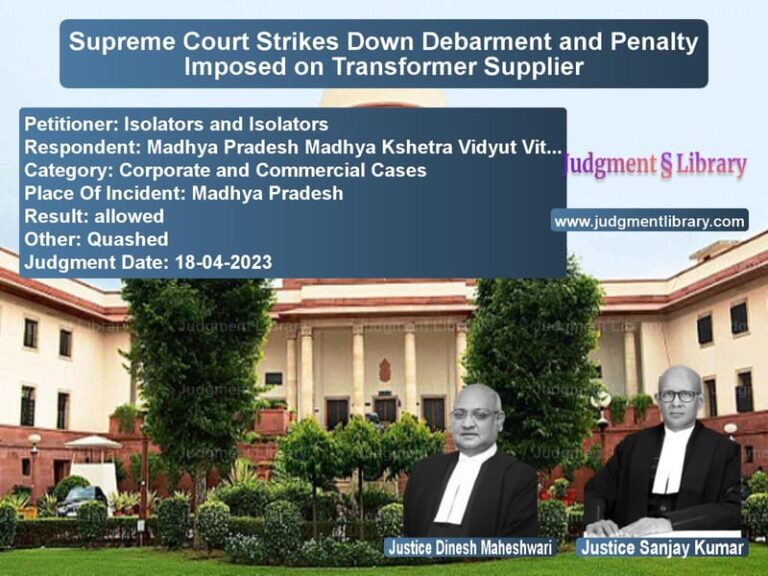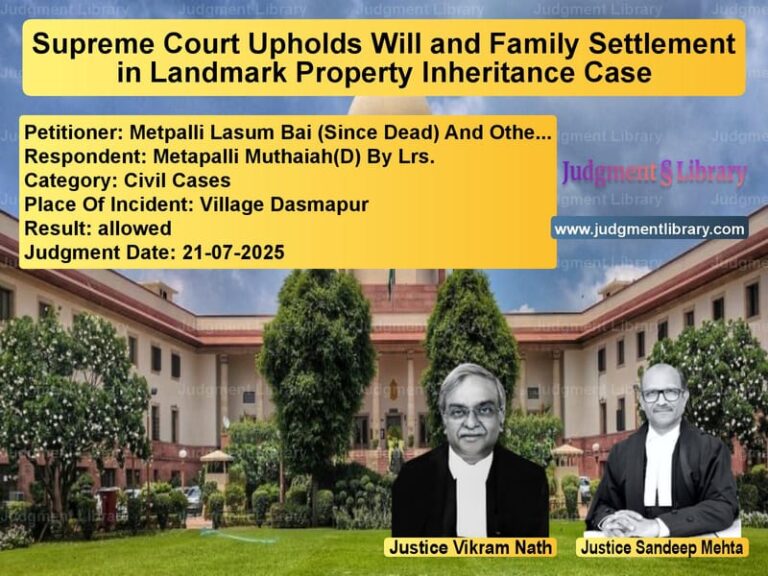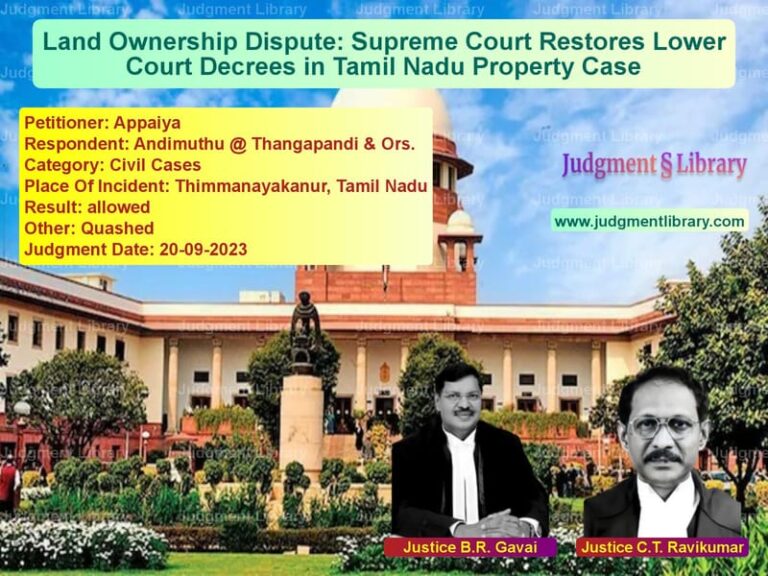Supreme Court Dismisses Habeas Corpus Petition: Analysis of Defamation and Judicial Inquiry
The case of Smt. Dhanlaxmi Urf Sunita Mathuria & Anr. v. State of Rajasthan & Ors. was brought before the Supreme Court of India under its extraordinary appellate jurisdiction. The primary contention revolved around a habeas corpus petition filed by the petitioners, alleging that their mother had been unlawfully detained by private respondents and that despite their efforts, the police failed to trace her whereabouts. However, before the proceedings could reach a decisive phase, the petitioners’ mother returned home, leading the High Court of Rajasthan to dismiss the habeas corpus petition as infructuous on July 4, 2024.
Despite this dismissal, the petitioners pursued further legal recourse, seeking an explanation from the police authorities regarding certain statements made during the hearing about the marital status of Petitioner No. 1. They argued that these statements were defamatory and humiliating and that the High Court ought to have directed the police to clarify their basis. The petitioners filed a review petition, which was dismissed on July 23, 2024, and later a miscellaneous application, which was also dismissed.
Petitioners’ Arguments
The petitioners, appearing in person before the Supreme Court, raised the following key points:
- They contended that Petitioner No. 1 was subjected to humiliation and defamation in open court due to statements made by the police regarding her matrimonial status.
- They argued that the High Court had initially directed the police to submit a clarification regarding these statements, but subsequently dismissed their petition without adequately addressing the issue.
- They asserted that the police statements about the divorce of Petitioner No. 1 and the subsequent remarriage of her former husband were baseless and made in bad faith.
- The petitioners urged the Supreme Court to intervene and direct the police to furnish a detailed explanation of how they arrived at such statements.
Respondents’ Arguments
The State of Rajasthan and other respondents countered the petitioners’ claims with the following arguments:
- They contended that the habeas corpus petition was rightly dismissed as infructuous since the mother of the petitioners had already returned home.
- They pointed out that the review petition and the miscellaneous application were dismissed on legal grounds, with the courts finding no procedural lapse in handling the matter.
- The respondents denied any deliberate attempt to defame or humiliate Petitioner No. 1, stating that statements made by police officials during judicial proceedings should not be construed as defamatory unless proven otherwise.
- They emphasized that the courts are duty-bound to inquire into all relevant aspects of a case and that any questioning or observations made during proceedings should not be taken as an affront to personal dignity.
Supreme Court’s Observations and Judgment
The Supreme Court, presided over by Justice Sudhanshu Dhulia and Justice Ahsanuddin Amanullah, examined the facts and legal submissions presented before it. After a detailed hearing, the Court made the following critical observations:
1. High Court’s Order of May 30, 2024
The petitioners relied heavily on the High Court’s order dated May 30, 2024, claiming that it directed the police to provide a clarification regarding their statements on Petitioner No. 1’s matrimonial status. The Supreme Court, however, found no merit in this contention and observed:
“Learned GA-cum-AAG has produced the status report. We have perused the status report.
Learned GA-cum-AAG seeks four weeks’ time to produce the corpus.
Time prayed for is allowed. List the matter on 04.07.2024.”
The Court held that this order did not, in any manner, direct the police to provide an explanation regarding the petitioners’ allegations. The claim made by the petitioners was, therefore, misconceived.
2. No Legal Basis for Claim of Defamation
The Supreme Court ruled that the petitioners’ grievance about defamation was baseless. It held:
“The grievance of petitioner no.1, that she has been defamed by the statements of the police officials and was humiliated in open court, is totally misconceived. Even if such statements were made before the High Court, we are unable to understand how it has caused any humiliation to petitioner no.1.”
The Court further emphasized that judicial proceedings often involve questioning and statements that might make individuals uncomfortable. However, such inquiries are essential for uncovering the truth and cannot be misconstrued as defamatory.
3. Courtroom Discourse and Fair Inquiry
Addressing the broader concern of statements made in open court, the Supreme Court stated:
“During court proceedings, many statements are made and questions are posed which may make a person uncomfortable, but all such statements or questions cannot be misinterpreted as humiliating a person. After all, it is the duty of the Court to reach the truth of the matter, and such an exercise may demand putting forward certain questions and suggestions which may be uncomfortable to some.”
The Court clarified that judicial inquiries should not be equated with personal attacks or humiliation.
4. No Further Relief Can Be Granted
Having dismissed the habeas corpus petition due to the return of the petitioners’ mother, the Supreme Court found no remaining legal issue warranting intervention. It noted:
“In the present case, the petitioners had simply approached the High Court, alleging that their mother had been unlawfully detained; and a quietus was given to the case when their mother returned home and thus, habeas corpus petition was disposed of. Thereafter, nothing was left in the matter, and the subsequent review petition, miscellaneous application as well as the present petition filed by petitioners are totally misconceived.”
Final Verdict
The Supreme Court dismissed the petition, finding it devoid of merit. The judgment reinforced the principle that courts should not entertain grievances that do not establish a legal claim. It also affirmed that statements made in court must be viewed in the context of judicial inquiry rather than being construed as personal affronts. All pending applications related to the case were also disposed of.
The ruling underscores the importance of a focused legal approach when seeking judicial remedies and clarifies that mere discomfort arising from courtroom discourse does not amount to defamation or humiliation.
Petitioner Name: Smt. Dhanlaxmi Urf Sunita Mathuria & Anr..Respondent Name: State of Rajasthan & Ors..Judgment By: Justice Sudhanshu Dhulia, Justice Ahsanuddin Amanullah.Place Of Incident: Rajasthan.Judgment Date: 11-02-2025.
Don’t miss out on the full details! Download the complete judgment in PDF format below and gain valuable insights instantly!
Download Judgment: smt.-dhanlaxmi-urf-s-vs-state-of-rajasthan-&-supreme-court-of-india-judgment-dated-11-02-2025.pdf
Directly Download Judgment: Directly download this Judgment
See all petitions in Bail and Anticipatory Bail
See all petitions in Custodial Deaths and Police Misconduct
See all petitions in Judgment by Sudhanshu Dhulia
See all petitions in Judgment by Ahsanuddin Amanullah
See all petitions in dismissed
See all petitions in supreme court of India judgments February 2025
See all petitions in 2025 judgments
See all posts in Criminal Cases Category
See all allowed petitions in Criminal Cases Category
See all Dismissed petitions in Criminal Cases Category
See all partially allowed petitions in Criminal Cases Category


